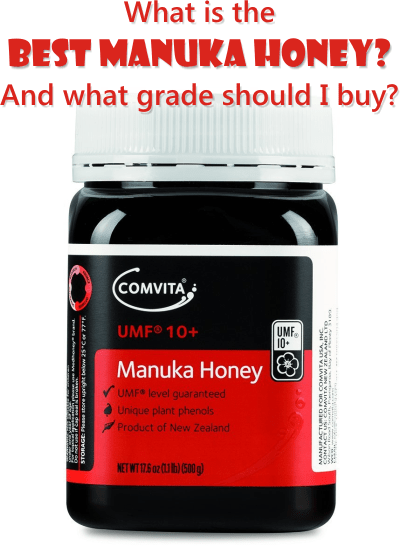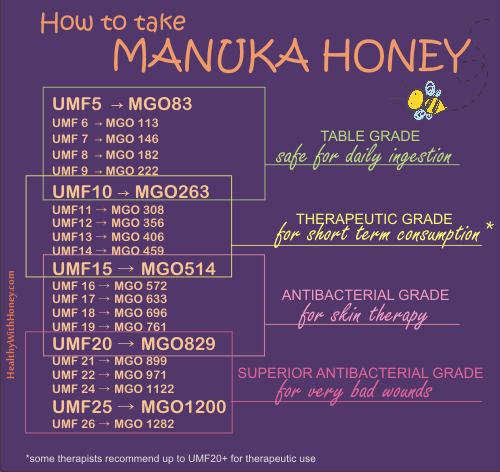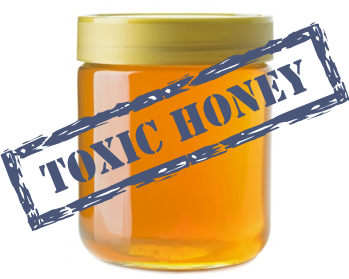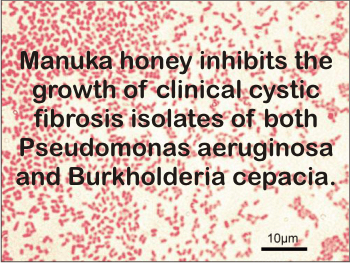Is there a natural way to cure stomach ulcer? Is honey good for ulcer or gastritis? Does manuka honey kill Helicobacter pylori? Or heal the ulcer?
Before going to check if the pain we feel is cased by an ulcer in our stomach (gastroscopy is the test that can accurately diagnose stomach ulcer) we hope we can solve the problem at home, by changing parts of our diets (actually eliminating some of the acidic food that give immediate pain or taking some supplements) considering that it is what we put inside that creates problems.
This is not wrong, many people have done this successfully, only that it may take longer to heal and the ulcer may come back after a period of time.
What can cause stomach ulcer?
An excessively acidic content is at the bottom of an ulcer. This acidic environment can be caused by poor food (with nutritional deficiencies), smoking, stress, prolonged treatment with non-steroidal anti-inflammatory drugs (such as Ibuprofen), or Helicobacter pylori – a common stomach bacterium that is considered to cause more than half of peptic ulcers worldwide and that has been implicated in stomach cancer.
Although more than half of the world’s population has the H pylori infection, for reasons still not quite understood most never develop ulcers.
How do I know I have stomach ulcer?
The only certain test is a gastroscopy. The CLO test (Campylobacter-like organism test), aka RUT test (Rapid urease test) is the test performed at the time of gastroscopy.
But symptoms can also tell us this might be the problem. The extreme pain we feel in the upper part of the stomach, before or after meals, bloating, fullness and nausea are symptoms associated with stomach ulcer. In severe condition, this may lead to complications such as perforation and bleeding (Malfertheiner et al., 2009).
If the ulcer erodes a blood vessel, gastrointestinal bleeding occurs, and a sudden loss of a large amount of blood can be life-threatening. It is also possible that the scarring and swelling caused by ulcers to obstruct the gastric outlet.
What drugs can we take for stomach ulcers?
Stomach ulcers are not that difficult to treat. First of all, they heal by themselves on condition that you adopt a more healthy diet and life-style. Secondly, conventional medicine has the proper treatment for ulcers, with some side-effects. The ulcer is cured, the tests are repeated for confirmation and everything looks fine.
The only problems are related to side effects and the fact that the ulcer can come back.
There are various classes of medication available for ulcer management including:
– Histamine-2 receptor antagonist such as cimetidine and ranitidine;
– proton-pump inhibitors such as omeprazole and esomeprazole;
– prostaglandin E analogues such as misoprostol (Chan & Lau, 2010).
But as shown by Dharmani et al, in 2006, Sandhya et al. in 2013 and others, all these drugs may lead to several side effects such as nausea, headache, abnormal heart rhythm and myelosupression.
When H pylori caused the ulcer, the existing antibiotics can cure 80 to 90 % of ulcers. However, over the years, H. pylori has become increasingly resistant to antibiotics. Which makes us turn to natural remedies once again.
Stomach ulcers may come back
Whatever the reason, stress, bad food and alcohol, non-steroidal anti-inflammatory drugs or Helicobacter pylori infection, stomach ulcers have a tendency of coming back. (This reminds me of Lazarev, a Russian healer who always says that you may cure your diseases, if you don’t heal the spiritual cause that triggered it, the disease will come back.)
Which is why it is good to know which are the natural products that can prevent it, and can help us heal it without having to take chemical drugs and experience the same side effects once again.
Is honey good for ulcers?
Honey is good for all kinds of ulcers. Even diabetic foot ulcers. An ulcer is an open wound, and honey can help it heal even if it is on our skin or inside ourselves, on our stomach lining.
Yet, honey is a controversial product when it comes to stomach ulcer. Some people cannot take a spoon of honey on empty stomach without having a feeling of vomiting the next second. I’ve always recommended them to take that honey diluted with water, or with a little bread. Yet, the question remains: is honey good for my stomach if I feel this way?
What types of honey are good for ulcer?
Manuka honey with high MGO content has proven anti-ulcer activities, due to its non-peroxide antibacterial component.
Non-manuka honeys have anti-ulcer activities, due to their antioxidant activity (Bertoncelj et al., 2007; Beretta et al., 2005; Meda et al., 2005, Bashkaran et al., 2011). Not all honeys have anti-ulcer activity. The efficient ones are the dark ones, the rule says that the darker the honey the more antioxidants it has.
Her are some of them: buckwheat, jarrah (2 to 3 times higher than in manuka honey or leatherwood honey), honeydew, blackberry, blueberry, heather, pine, tualang, Indian forest, gelam, pineapple, lavender, strawberry tree honeys.
Propolis. Phenolic compounds are phytochemicals also found in high amounts in propolis and they are believed to contribute to the antiulcer activity (Pillai et al., 2010) as it has strong correlation with antioxidant activity (Bertoncelj et al., 2007; Beretta et al., 2005; Meda et al., 2005).
Has science confirmed that honey can cure ulcers?
That honey is good for our digestive system is not a simple traditional claim. Though it does not know all its mechanisms of action, research and studies confirmed that honey is good for the stomach and for the entire digestive system.
Kelulut honey reduced stomach ulcer
• The study published in 2018 “Antiulcer Properties of Kelulut Honey against Ethanol-Induced Gastric Ulcer conducted by Latifah Saiful Yazan and his research team from Universiti Putra Malaysia, ” investigated whether the antioxidants in kelulut honey could provide protection against stomach ulcer development.
The team placed 18 rats into three different treatment groups. Group #1 was the control group (without
ulcer, without kelulut honey), group #2 was positive control group (with ulcer, without kelulut honey) and group #3 was treatment group (with ulcer and treated with kelulut honey).
The treatment consisted of kelulut honey (1183 mg/kg) which was given twice daily for 30 consecutive days by oral administration. On Day 31, the rats were induced with absolute ethanol (5 mL/kg) via oral administration after being fasted for 24 h and were sacrificed 15 min after the induction. After macroscopic and histopathological evaluation of their stomach the results showed that pretreatment with kelulut honey significantly reduced (p<0.05) both the total area of ulcer and the ulcer index compared to the positive control group. The percentage of ulcer inhibition in the KH pre-treated group was 65.56% compared with the positive control group.
The treatment, kelulut honey, exhibited anti-ulcer properties against ethanol-induced gastric ulcer.
Kelulut honey was found to be able to increase rats’ body weight as well as to possess anti-ulcer properties that were seen to reduce the total ulcer area and ulcer index in rats with ethanol induced gastric.
Researchers concluded that “the anti-ulcer properties of kelulut honey are believed to be due to its high antioxidant properties.”
Kelulut honey is high in antioxidants. It has a dark color which indicates the presence of carotenoids and flavonoids, which are renowned as natural antioxidants (Moniruzzaman et al., 2013b; Saxena et al., 2010), while total phenolic
content is one of the reliable parameters for indicating antioxidative activities (Bertoncelj et al., 2007; Beretta et al., 2005; Meda et al., 2005) as well as effectively healing induced gastric ulcers (Bafna & Balaraman, 2005).
Does manuka honey kill H. pylori?
Manuka honey has proved powerful antibiotic power. In vitro it is able to kill H pylori, however there have been clinical trials that were not successful at completely eradicating the bacterium at certain MGO concentration. Yet, manuka honey is able to heal the wound and inhibit urease production, thus creating an unfavorable environment for the growth of bacteria.
Manuka honey shows urease inhibition.
Urease is an enzyme produced by H pylori (but not only, other urease-producing bacteria were isolated and identified from the oral cavity and stomach. Takako Osaki et al in 2008)
H. pylori produces urease to spur the breakdown of urea, a naturally occurring chemical in the body, so that urea can release ammonia and make the gut an environment in which the pathogens can thrive.
 • The 2017 study Manuka honey (Leptospermum scoparium) inhibits jack bean urease activity due to methylglyoxal and dihydroxyacetone, by Rückriemen J et al. from the Institute of Food Chemistry, Technische Universität Dresden, Germany, showed that manuka honey is able to inhibit urease production mainly due to its 2 specific components, methylglyoxal (MGO) and dihydroxyacetone (DHA). In the study non-manuka honeys, which lack MGO and DHA, showed significantly less urease inhibition.
• The 2017 study Manuka honey (Leptospermum scoparium) inhibits jack bean urease activity due to methylglyoxal and dihydroxyacetone, by Rückriemen J et al. from the Institute of Food Chemistry, Technische Universität Dresden, Germany, showed that manuka honey is able to inhibit urease production mainly due to its 2 specific components, methylglyoxal (MGO) and dihydroxyacetone (DHA). In the study non-manuka honeys, which lack MGO and DHA, showed significantly less urease inhibition.
This study confirms the good benefits of eating manuka honey in stomach ulcers, especially if these are caused by Helicobacter Pylori infection. It does not show a complete eradication of the bacterium, but a reduction of urease, a fact that does not favor bacterium growth.
This could be the scientific explanation for the New Zealanders’ advice:
‘for ulcer relief, eat a tablespoon of manuka honey spread on bread
an hour before each meal.’
The UMF grade is important.
• A clinical trial conducted by Dermot P B McGovern at the Gastrointestinal Department, Royal Cornwall Hospital, Truro, Cornwall, UK, and published in Journal of the Royal Society of Medicine in 1999, showed that manuka honey (11.7% phenol equivalent) was effective against dyspepsia, though it was ineffective at eradicating H. pylori.
The study was done on 12 patients with confirmed active H. pylori infection. 6 patients were treated with 1 tablespoon of manuka honey 4 times per day for 2 weeks. The other 6 patients were treated with honey and omeprazole 20mg twice per day for the same 2 weeks.
4 weeks after the completion of treatment regimens the 14C urea breath test was repeated and showed that all 12 patients remained positive for H. pylori.
Unfortunately this trial was done using manuka honey UMF 11 (11.7% phenol equivalent) while an in-vitro experiment used UMF 13 and was successful. (According to Allen et al, 1991, a UMF of 10, has the same antibacterial activity to a 10% solution of phenol).
This means we need manuka honey with a higher UMF grade.

• A 2014 study showed that honey fractions (regular and manuka) were good inhibitors of H. pylori urease and may serve as a template in the development of urease inhibitors in pharmaceuticals.
Chloroform extract of honey showed 48 and 42% inhibitory activities against urease from H. pylori (369C) and H. pylori (ATCC 43526), respectively, whereas diethyl ether extract of manuka honey showed 45 and 51% inhibitory activities against urease from H. pylori (369C) and H. pylori (ATCC 43526), respectively.
• A 1994 study tested the sensitivity of Helicobacter pylori to honey, using isolates from biopsies of gastric ulcers. It was found that all five isolates tested were sensitive to a 20% (v/v) solution of manuka honey in an agar well diffusion assay. A 40% solution of regular honey with hydrogen peroxide antibacterial activity, had no effect on H pylori.
• A 2012 study tested the ability of manuka honey, brocoli sprouts and omega-3 oil to limit H. pylori-associated inflammation. Each food significantly attenuated the release of IL-8 by H. pylori-infected cells. Omega-3 oil and manuka honey independently enhanced the antiinflammatory effect of the isothiocyanate-rich broccoli sprouts.
• A 2016 study examined the molecular mechanisms by which natural honey can inhibit H. pylori infection in gastric epithelial cells.
H. pylori induced NF-κB and AP-1 DNA-binding activity in gastric epithelial cells. Manuka honey inhibited H. pylori-induced NF-κB and AP-1 in a time- and dose-dependent manner. Maximum inhibition of H. pylori-induced NF-κB and AP-1 by manuka honey was observed at concentrations of 20% at 1-2 h.
Pre-treatment of AGS cells with other commercial natural honeys also inhibited H. pylori-induced NF-κB and AP-1 DNA-binding activity. Honey prevented H. pylori-induced degradation of IκB-α protein and downregulated COX-2 protein levels.
Natural honey exerts its inhibitory effects against H. pylori by inhibiting NF-κB and AP-1 activation and downregulation of COX-2 expression.
Saudi Honey
• A 2013 study conducted by Nabila Al-Jaber and published in Food and Nutrition Sciences, analyzed the relationship between antioxidant and anti-ulcer activities in Saudi honey samples harvested from various
regions and in different seasons.
The results showed that some honey samples had a high significant reduction in the values of the ulcer indices and areas, in rats that received the honey samples. But not all the honeys improved the gastric damage, only the ones with high anti-oxidant activity and contains certain types of flavonoids can be used to treat stomach ulcers effectively.
Other natural products that help in healing stomach ulcer:
Broccoli sprouts, omega-3 oil, ginger, plantain bananas, turmeric, chamomile, garlic, licorice, aloe vera. Don’t forget that combinations of these with honey have a higher action. Here is one of the most common folk remedy for stomach ulcer: 1 tablespoon of honey with 1/4 teaspoon of cinnamon in a cup of water.
And here is the story Louis shared with us, with the treatment he followed that healed his ulcer in 3 weeks. His comment can be found at the article about how to understand manuka honey better. Thank you, Louis, for sharing your story with us.
1. UMF 10-15 grade Manuka honey. Take it on a empty stomach but consume it with something like a wholewheat cracker even fruit which allows it to remain for longer in the stomach.
2. 1st thing in the morning on a empty stomach (45 min before breakfast or any honey) take Mastic Gum along with a buffered Vitamin C powder. This attacks the bacteria directly. Followed by Manuka honey with a cracker or small piece of fruit. Then breakfast.
3. Add to your diet the following through intervals in the day.
– Zinc
– Iron
– L Glutamine ( will help heal your stomach lining )
– Cabbage juice
– Garlic tablets
– Vitamin B12 & B complex injections
H – Pylori gets a grip on your stomach in the absence of Vitamin B12 and Iron in your system. The Mastic Gum and Manuka honey kills it. The rest weakens and irritates the bacteria.
I had a very serious H pylori infection and this cocktail after much searching and experimenting is what killed it off.
Avoid sugar, alcohol, white bread, dairy product, red meat.
Eat Blue berries, almonds, high fibre diet, lots of vegetables especially Broccoli.”
It sounds like a healthy diet, highly recommended. If you have also experienced with manuka honey and Helicobacter pylori please don’t hesitate to tell us your story.
*****************



